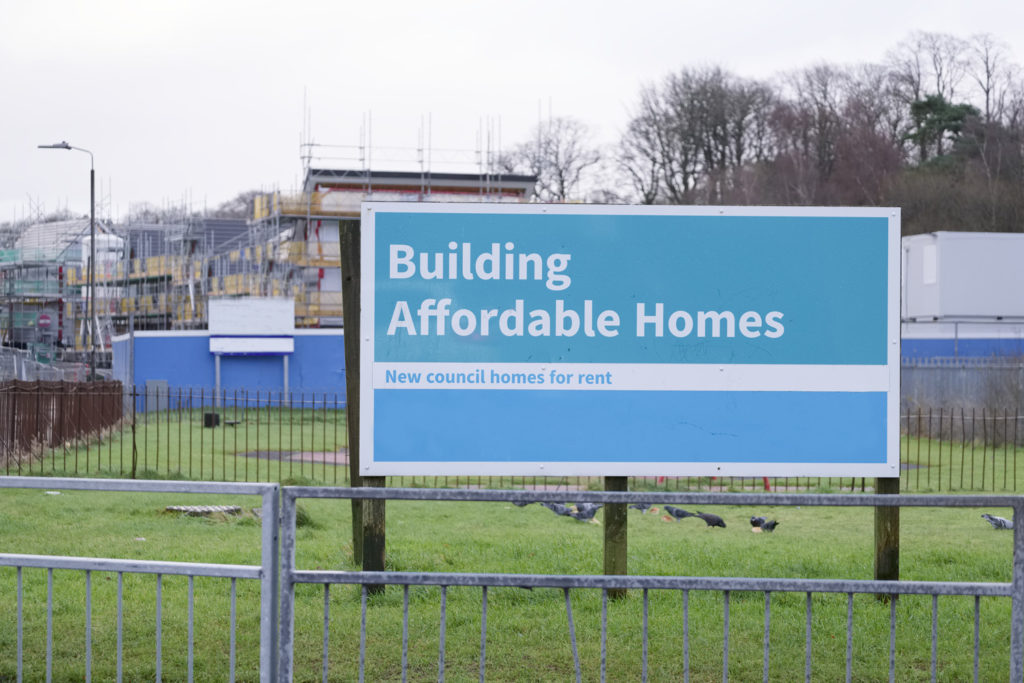Chancellor Rishi Sunak unveiled his Autumn Budget yesterday, which included £24bn for housing and £5bn to remove unsafe cladding, as well as more money for education and the construction of 40 new hospitals and 70 hospital upgrades, with additional funding for ‘levelling up’ too. Here we garner opinion from across the sector.
Much-needed funding boost welcome but no age of optimism for council finances — London Councils
London Councils has welcomed the much-needed increase in funding announced by the Chancellor, while stating that the boost will not be enough to establish an age of optimism in local government finances.
The cross-party group warns of particular pressures in London due to:
- The lack of government compensation for boroughs’ £400m local tax losses caused by COVID-19
- Uncertainty over adult social care funding reforms
- London receiving a lower share of levelling up investment.

London Councils also highlights that the extra investment will not bring funding back to 2010 levels. London boroughs have seen a 25% reduction in funding since 2010, even though population growth means there are now a million more Londoners.
Cllr Georgia Gould, Chair of London Councils, said: “We’ve seen some recognition of the vital role that local services play in our communities but we urgently need more resources.
“Boroughs have proved themselves crucial in the response to COVID-19 and are determined to secure a post-pandemic recovery that drives green growth and tackles inequalities in the capital. London is a dynamic, successful city but also a place of immense challenges — including the highest unemployment, homelessness, and relative poverty rates in the UK.
“However, the announced funding increases aren’t enough to meet the huge challenges facing our communities. In particular, there remains great uncertainty over adult social care, which is the largest area of council spending and supports some of our most vulnerable residents. We’re also deeply concerned that London is missing out on a fair share of levelling up support.
“We’ll continue working with the Government on our shared ambitions while also making the case to ministers for the powers and resources we need to make faster progress.”
In its initial assessment of the Spending Review’s implications, London Councils expressed concern about the lack of government compensation for boroughs’ local tax losses incurred in this financial year as a result of the pandemic. The disproportionate impact of COVID-19 on London’s economy means London boroughs must deal with tax losses of £400m over the next two years.
The umbrella body also noted the continuing uncertainty over future arrangements for adult social funding. London Councils has highlighted the need for £400m of additional annual investment in the capital’s adult social care services to meet demand pressures. There are 150,000 Londoners — many of them of working age — receiving adult social care support and levels of demand are rising fast.
The Spending Review confirmed that London will receive a lower share of the Levelling Up Fund compared to other regions in the UK, which means disadvantaged communities in the capital will lose out on support.
London has the highest rates of relative poverty in the UK and the economic impact of COVID-19 has hit London hard, with the capital experiencing the country’s highest rise in job losses and unemployment.
London has the UK’s highest unemployment rate at 5.8% (compared to the UK average of 4.5%). 400,000 Londoners are claiming unemployment-related benefits. The latest figures show around one million Londoners claiming Universal Credit. Youth unemployment remains a considerable challenge for London, with one in five young people in the capital aged 16 to 24 currently without a job.
National Housing Federation
The budget is a welcome commitment of support in key areas, after a year that has seen families across the country struggling to afford the cost of living.
Levelling up is a priority for housing associations, who are ready to play their part in tackling local inequalities and helping communities up and down the country to thrive. The additional £1.8bn for brownfield regeneration is welcome news, alongside last week’s confirmation of the next wave of Social Housing Decarbonisation Fund, which represents an important step toward reaching our net zero ambitions.
While it won’t mitigate the full impact of the loss of the £20 Universal Credit uplift, particularly during the winter months and for people who aren’t working, it is positive that the government has recognised the need to support families on the lowest incomes by reducing the Universal Credit taper. We also welcome the focus on homelessness prevention and longer term commitment to reduce homelessness but it is disappointing that there is no additional, long term funding for all forms of supported housing, which is vital for allowing those with support needs to thrive in their home and can reduce pressure on adult social care.
Unfortunately, the consequences of no additional direct funding to fix building safety issues in social rented homes will be far reaching, leading to a loss of new affordable homes and less money for existing social homes. However we support the Residential Property Developer Tax, which goes some way toward holding those responsible for this crisis to account for the cost of making buildings safe in the future.
Local Government Association
Responding to the Government’s announcement in the Spending Review of £2.6bn for new school places for children with special educational needs and disabilities (SEND), Cllr Anntoinette Bramble, Chair of the Local Government Association’s Children and Young People Board, said: “This funding is good news to help children with special educational needs and disabilities (SEND) access the support they need without having to travel too far.
“To further support the education of children with special educational needs and disabilities, the Government should urgently complete its ongoing review of the SEND system, as children with SEND will undoubtedly need additional support to help address lost learning due to the impact of the pandemic.
“This review needs to set out reforms that increase mainstream inclusion, provide councils and schools with long-term certainty of funding to meet the needs of all children with SEND, and give councils the power to hold education and health partners to account if their provision for identifying and supporting children with SEND is not adequate. We are also calling for high needs block deficits to be written off.”
Local Government Information Unit (LGIU)
Jonathan Carr-West, Chief Executive of LGIU, said: “The Chancellor’s budget proved more generous than expected for many. Local government will be pleased that a key sector demand has been listened to as we finally have a multi-year settlement that allows for better long term planning for councils.
“Grant increases of £1.6bn per year for the next three years and a 3% increase in core spending power, do not undo a decade of cuts but they are a step in the right direction. However, we should never forget that this 3% increase depends on councils taking the political risk of increasing council tax to the maximum permitted extent.
“Social care costs will continue to rise, especially given the announcement of an increase in the minimum wage. That will eat into most, if not all, of a 3% increase in spending power. And, it’s still far from clear when the benefit of national insurance contribution increases will be felt across social care.
“The wait continues for the Government’s much anticipated Levelling Up White Paper. And, for those who believe that levelling up can only succeed in partnership with local government, there was little grounds for optimism in this budget which continues to be allocated through bid funding and regional and sub regional authorities getting the largest chunks of it.
“After over a decade of austerity, local government has learned to take nothing for granted and to read the small print very carefully. Nonetheless, a sector that was braced for more pain will be feeling this afternoon that things could have been worse.”
Aster Group
Bjorn Howard, Group Chief Executive at Aster Group commented: “The Government promised to focus on levelling up and empowering communities recovering from COVID-19. Certainly, the changes to the Universal Credit earnings taper coupled with the creation of new opportunities through the ‘skills revolution’ has the potential to make a positive and lasting impact on people’s lives and the sectors experiencing a skills shortage, such as construction.
“In terms of delivering new homes, unlocking derelict and unused land to build new properties to help achieve this ambition is undoubtedly needed, but there should also be a conversation about the infrastructure and support these sites need, and where they will be located.
“Developing brownfield sites is more expensive than normal so these additional costs shouldn’t disrupt the delivery of affordable homes. This will be essential if the £11bn committed to fund new affordable development is to deliver the homes people really need, in places they want to live.
“A partnership approach will be key to making brownfield funding work for everyone. We need a strategic approach, led by government, that links local authorities, housebuilders and housing associations to a common aim, to provide homes for the communities that need them.”
Living Space Housing
Chris Loizou, Land and Partnerships Director for Living Space Housing said: “We welcome Chancellor Rishi Sunak’s Autumn Budget, particularly the £11.5bn commitment to boost provision of affordable housing. In addition, he announced a cash injection to regenerate more Brownfield land. The supply of new housing has been suppressed — in correlation to demand — for too long, causing the UK’s chronic housing shortage. The announcement of these two significant new funds could accelerate delivery of much-needed affordable and open market new homes, while regenerating previously used land in the process.
“We are also encouraged by the early details of an overhaul to the planning system. Enabling high quality, well-designed development to be brought forward in a consistent and efficient manner is crucial to alleviating the housing shortage. The digitisation of outdated processes is long overdue and could help smaller residential developers — such as Living Space — to mitigate the unforeseen delays and backlogs that hold up sites from being delivered. However, it is also apparent that Planning Authorities across the country need more funding to train and retain more Planning and Highways professionals, in order to expediate the process. Each successive Government has so far failed to resolve this key issue.
“We also welcome the announcements for; increased investment into education, skills training and family hubs; the £4.8bn grant funding for local councils; the £6.9bn pledge to enhancing transport infrastructure in the major regional conurbations; and the commitment made to tackle NHS backlogs, which will benefit us all.”
LCR, the Government’s regeneration and placemaking expert
Peter Hawthorne, Chief Executive of LCR said: “When ironing out the practicalities of the £1.8bn brownfield fund, the opportunities available on transport-linked land should not be overlooked. There is space for tens of thousands of homes on brownfield sites surrounding the UK’s railway network.
“The £7bn in funding for regional transport transformation also announced by the Chancellor should help on this front, freeing up more of the brownfield land surrounding transport hubs for development to create homes, regenerate communities and drive levelling up.
“However, the availability of capital isn’t the only factor holding back more brownfield development. Many sites with significant potential, particularly in town centres, have complex, piecemeal ownership structures and require close private and public sector collaboration to unlock.
“The £65m to help digitise the planning system could make it easier for planners and local authorities to identify and bring forward the opportunities that the brownfield fund is committed to supporting.”
Wates Group
Stephen Beechey, Group Public Sector Director, Wates Group commented: “We welcome the Chancellor’s budget and, as a business with a significant national footprint, we are particularly buoyed by the Government’s continued focus on levelling up, including a 20% increase in funding for new affordable homes and the 100 local infrastructure projects that will benefit from the levelling up fund.
“The construction industry stands ready to start creating the thousands of new homes the country needs, updating and building hundreds of modern schools and colleges, and the infrastructure required to address some of the longstanding inequalities between north and south. The increase in capital spending for healthcare to £11.2bn, including to upgrade the existing healthcare estate, will also be crucial in supporting the NHS to achieve its net zero ambitions.
“As an employer focused on the skills needed for the future, we were pleased to see a commitment to a “skills revolution”. The new funding for T-Levels and adult education will help equip the next generation of construction workers with the skills they need to succeed in a post-pandemic net zero economy.”

PwC
Evie John, Director at PwC, said: “Any increase to the supply of homes is welcome, particularly when there is a commitment to affordability and a sustainable approach to development. While an additional 180,000 new homes does leave the Government with some way short of its ambitions, this is a step forward.
“Our research tells us that people see a focus on affordable and quality housing as one of the most effective means of levelling up the UK, and tackling the housing shortage has been a priority for successive Governments. While individual programmes of funding
will always be useful, it is essential that all levels of government, industry and local communities come together to address the complex picture of need, quality and affordability that exists across the country. This is how specific housing targets will be achieved while addressing the wider levelling up agenda.”
Irwin Mitchell
Nicola Gooch, Planning Partner at Irwin Mitchell said: “Rishi Sunak has tried to present a budget focussed on investment and optimism. Many of the announcements had been widely trailed over the last few days. Perhaps the most significant ‘new’ announcement was the £4.8bn uplift in general local authority funding over the next three years — described ‘the largest increase in core funding for over a decade’. Many of the problems in the planning system at present are a direct result of under-resourced local authorities struggling to cope with the volume of applications they face. As such, this additional funding is likely to be extremely welcome. That said, planning is not the only local authority department struggling for cash. Councils are also responsible for funding social care, education and a wide range of other local services. As such, whether any of this money makes its way to local authority planning departments will have to be seen.
“The new incentives for ‘green investment’ are also to be welcomed, however they sit uncomfortably next to announcements of major investment into our roads networks and a cut in air passenger duty for domestic flights.”
As to the funds already announced: “Regenerating brownfield land can be notoriously expensive, so the additional funds to support Councils’ remediation efforts is to be welcomed. This latest tranche of funding for brownfield land, in addition to the £400m Brownfield Housing Fund and the £75m Brownfield Land Release Fund, indicates that the Government may be serious about the ‘brownfield first’ pledges that Johnson made in his conference speech earlier this month.
“The £65m of investment into the digital transformation of the planning system is also a welcome recognition that the current software relied on by council planning departments may no longer be fit for purpose. Given that this announcement follows hot on the heels of DLUHC’s announcement that 13 Councils have been awarded a share of the £1m PropTech Engagement Fund to pilot ‘innovative’ new digital consultation tools; it seems clear that the pledge to digitise and modernise the planning system may be one of the few proposals from last year’s Planning White Paper left standing.”
SO Resi
Kush Rawal, Director of Residential Investment at SO Resi commented: “In addition to our existing new shared ownership schemes that are built to high energy efficiency standards and meet current building regulations, we are currently working on a number of schemes due for delivery over the next 12 months that put sustainability at their very core and go above and beyond what is expected — particularly within the affordable homes sector.
“However, it is important that we strike a balance and that the government ensures a move to green living remains affordable for both the consumer and housing provider, otherwise we risk creating a two-tier society where being sustainable is only for those who can afford it.
“Fundamentally our priority is to ensure we continue to deliver a high volume of quality, affordable homes to those who need them most. Key to this is providing an affordable route to homeownership through shared ownership for the many people who cannot afford to buy on the open market. The new Affordable Homes Programme will bring about various changes to the delivery of shared ownership. Whilst we welcome the commitment from the government in supporting affordable homeownership, the Chancellor needs to address the wider issues in the housing market surrounding affordability and accessibility to homes.
“The property market is in crisis, with inflated house prices due to a combination of pent-up demand and the ripple effects of the stamp duty holiday. While there will inevitably come a tipping point and the market will eventually return to normal, for the many young people who dream of homeownership now, shared ownership is often the only realistic option. We need to ensure that shared ownership is protected, with adequate long-term funding from the government, otherwise we risk losing a generation of would-be homeowners.”
Womble Bond Dickinson
 Simon Lewis, construction partner law firm Womble Bond Dickinson, commented: “The £5bn grant which will be set aside to pay to remove unsafe cladding from the highest-risk buildings in the country was of course welcome in today’s Budget Announcement, but as always, the devil is in the detail. Given the significant number of buildings that have been found to be unsafe, limiting this just to “higher risk buildings” and only for cladding is overlooking all of the other unsafe buildings that fall outside these parameters. The sum is of course significant but it probably won’t be enough to deal with all higher risk buildings with poor cladding and certainly won’t be enough to deal with all unsafe buildings. The Government expects the RPDT to raise £2bn, but where is the rest of the funding coming from? It would be useful to know more about how the Government intends to support the industry to meet these costs.
Simon Lewis, construction partner law firm Womble Bond Dickinson, commented: “The £5bn grant which will be set aside to pay to remove unsafe cladding from the highest-risk buildings in the country was of course welcome in today’s Budget Announcement, but as always, the devil is in the detail. Given the significant number of buildings that have been found to be unsafe, limiting this just to “higher risk buildings” and only for cladding is overlooking all of the other unsafe buildings that fall outside these parameters. The sum is of course significant but it probably won’t be enough to deal with all higher risk buildings with poor cladding and certainly won’t be enough to deal with all unsafe buildings. The Government expects the RPDT to raise £2bn, but where is the rest of the funding coming from? It would be useful to know more about how the Government intends to support the industry to meet these costs.
“There is a risk that the additional costs on developers from the RPDT (and the gateway 2 levy) will simply be passed on in increased costs for leaseholders and purchasers of new buildings. The Government’s Impact Assessment already estimates that the cost of complying with the Building Safety Bill/Act will be £3bn, the bulk of which will fall on the industry and is likely to be passed through to the consumer/end user. This announcement doesn’t directly address the central issue of how leaseholders can be rescued from the often crippling costs of making these buildings safe and the sector needs to address this urgently.”
UK Green Building Council (UKGBC)
Julie Hirigoyen, Chief Executive at UKGBC said: “With the COP 26 conference just days away, the Chancellor’s announcements felt like they were from a different planet and a different time. Whilst we welcome changes to business rates to incentivize investment in renewable technologies, new research and development funding, and grants for local authorities, there were no big announcements to fill the clear gap that has emerged round decarbonising existing buildings.
“With the Budget and Spending Review coming together, this was evidently the Chancellor’s big opportunity to plug the major gaps in the Government’s Net Zero and Heat and Buildings Strategies, and put the UK on a firm path to net zero over the next few years. By supporting the industry’s plan for a national programme to retrofit our homes, the Government could have delivered substantial progress towards net zero and unlocked a new wave of green jobs to help level up the country. Instead, attention to net zero was tokenistic, repeating old announcements alongside incongruous headlines around carbon-intensive investment in roads, cutting air passenger duty and fuel-duty freezes.
“If the Chancellor is serious about building a strong, resilient economy, then turbo charging the green economy should be at the centre of all investment plans and skills initiatives, not merely be an afterthought. Every year that we fail to invest in tackling climate change increases the financial burden on future generations and Governments. With the UK’s green credentials in the spotlight next week, and public concern about climate change at an all-time high, these announcements could not be more disappointing.”
Construction and regeneration business Real
 Paul Nicholls, CEO of Real, said: “As a residential contractor and regeneration specialist, the confirmation today of the £11.5bn Affordable Homes Programme to build 180,000 homes and the announcement of the £1.8bn fund to support up to 160,000 homes to be built on brownfield sites is very welcome.
Paul Nicholls, CEO of Real, said: “As a residential contractor and regeneration specialist, the confirmation today of the £11.5bn Affordable Homes Programme to build 180,000 homes and the announcement of the £1.8bn fund to support up to 160,000 homes to be built on brownfield sites is very welcome.
“The Government must seize this opportunity to ensure public investment maximises the construction of affordable housing and supports the recruitment of as many new construction professionals as possible.
“This is a golden chance to build back better with more people being housed in homes they can afford, built by a new generation of skilled British construction workers. At Real, we are 100% behind efforts to build back better. Although we are a new business launched this year, we already have a pipeline of £1.4bn and have secured new contracts worth £100m.
“We are also investing in new talent, with apprentices and graduates joining our training programmes across our business in London, the South East and the South West. These are just the start as we see investment in the next generation as the way to ensure our future.”
Construction Industry Training Board (CITB)
CITB Policy Director Steve Radley said: “Today’s announcement on infrastructure spending, on top of government plans to meet its net zero commitments, show it’s critical to invest in construction skills.
“With employers already facing significant skills pressures, we must attract new talent from all areas and upskill the existing workforce.
“Today’s large-scale investments in T levels, maths, Skills Bootcamps and modernising Further Education will provide crucial support on skills and should help to ease pressure on employers looking to recruit and train. Building better pathways into work through traineeships and bootcamps and helping colleges to modernise are key investments. We look forward to building on our work so far to shape these programmes to deliver the skills the industry needs.”
Time to deliver on Green promises, says AceOn
 Leading energy pioneer AceOn welcomed Chancellor Rishi Sunak’s commitment to driving forward measures to tackle climate change — but said his Budget could have gone further. The company — a leading national innovator in battery and energy storage technology — said it was deeply disappointed Mr Sunak had failed to take the opportunity to scrap VAT on zero and low carbon products.
Leading energy pioneer AceOn welcomed Chancellor Rishi Sunak’s commitment to driving forward measures to tackle climate change — but said his Budget could have gone further. The company — a leading national innovator in battery and energy storage technology — said it was deeply disappointed Mr Sunak had failed to take the opportunity to scrap VAT on zero and low carbon products.
AceOn Energy Managing Director Richard Partington said the Government could afford no delays in tackling the climate emergency.
“The COP26 climate change conference in a few days’ time will make it absolutely clear that time has run out for more talk from Governments all over the world — and that action is now desperately needed.
“There are many green measures in this speech which we welcome, such as the Net Zero strategy to invest £30bn in green industries, but the fact that there is no promise to bring in a zero VAT rating for zero and low carbon products is deeply disappointing.
“We used to be told that the Government could not act freely on VAT because it was tied in with EU regulations. But that is not the case now so we wonder why this simple change which could do so much to help our fight against climate change has not been introduced.
“It is beyond belief that energy storage batteries can currently carry 20 per cent VAT while domestic coal carries just five per cent, or that the Government can give nearly £12bn in annual tax breaks to fossil fuel producers while providing only £8bn to drive uptake of renewable energy.
“The work we are doing at AceOn around sustainable energy storage, next-generation battery technology, second use for batteries and helping train and upskill a new generation of installers can make a huge difference to this country meeting its environmental targets and responsibilities.
“But we have to be given a level playing on which to compete and deliver the change which is now urgently needed if we are going to avoid an environmental catastrophe.”
Header image ©johndwilliams/AdobeStock









